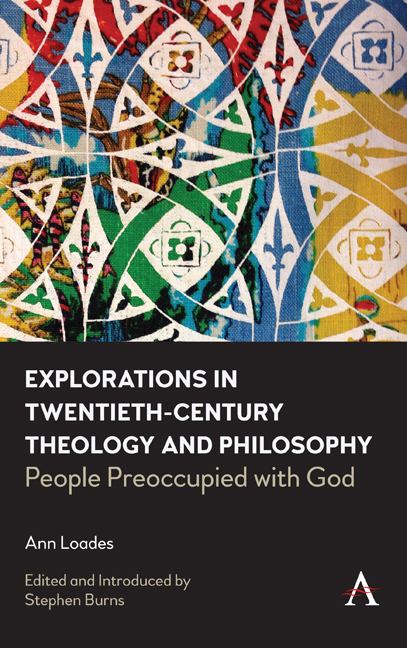Book contents
- Frontmatter
- Contents
- A Personal Note
- Foreword
- Introduction: The Grace of Intelligence
- Chapter One Evelyn Underhill (1875–1941): Mysticism and Worship
- Chapter Two Evelyn Underhill: As Novelist – Exploring Mysticism
- Chapter Three Dorothy L. Sayers (1893–1957): War and Redemption
- Chapter Four Dorothy L. Sayers: Are Women Human? Considering Dante’s Beatrice
- Chapter Five C. S. Lewis (1898–1963): On Gender
- Chapter Six C. S. Lewis: On Grief
- Chapter Seven Austin Farrer (1905–1968): Love Almighty and Ills Unlimited
- Chapter Eight Austin Farrer: And Friends
- Chapter Nine Simone Weil (1909–1943): Resistance and Writing
- Chapter Ten Simone Weil: Eucharistic Sacrifice – Exploring a Metaphor
- Chapter Eleven Stephen Sykes (1939–2014) and Colleagues: Exploring the Problematic Legacy of Power
- Afterword: The Passionate Intellect of Ann Loades
- Acknowledgements
- Bibliography
- Contributors
- Index
Chapter Three - Dorothy L. Sayers (1893–1957): War and Redemption
Published online by Cambridge University Press: 18 November 2023
- Frontmatter
- Contents
- A Personal Note
- Foreword
- Introduction: The Grace of Intelligence
- Chapter One Evelyn Underhill (1875–1941): Mysticism and Worship
- Chapter Two Evelyn Underhill: As Novelist – Exploring Mysticism
- Chapter Three Dorothy L. Sayers (1893–1957): War and Redemption
- Chapter Four Dorothy L. Sayers: Are Women Human? Considering Dante’s Beatrice
- Chapter Five C. S. Lewis (1898–1963): On Gender
- Chapter Six C. S. Lewis: On Grief
- Chapter Seven Austin Farrer (1905–1968): Love Almighty and Ills Unlimited
- Chapter Eight Austin Farrer: And Friends
- Chapter Nine Simone Weil (1909–1943): Resistance and Writing
- Chapter Ten Simone Weil: Eucharistic Sacrifice – Exploring a Metaphor
- Chapter Eleven Stephen Sykes (1939–2014) and Colleagues: Exploring the Problematic Legacy of Power
- Afterword: The Passionate Intellect of Ann Loades
- Acknowledgements
- Bibliography
- Contributors
- Index
Summary
Dorothy L. Sayers came to maturity during World War I and lived through the eventful responses to it of the 1920s and 1930s, responses that led almost inevitably to the turmoil and disasters of World War II. More directly and intentionally than C. S. Lewis and the other friends who shared these times and stared with her at the possible collapse of European society, she came to see her most pressing call to be helping her nation move beyond the wars and their consequences. She believed that recovery required society to become more just and that it could become so only by reappropriating basic Christian beliefs: creation, incarnation, Trinity, sin, atonement. These dogmas teach us the truth about ourselves and God; consequently, they show us how we can live in the ‘city’ more justly than had been done in the years leading up to and including the two world wars.
The dogmas are not abstract principles; they find their meaning in life. When rightly held, they are at work directing the drama of the soul's choice. The doctrines must be shown, presented, made visible, so that persons can grab hold of them and give them root. Thus, she has the choir in her 1946 play, The Just Vengeance, pray for God to ‘throw open the gates’, to ‘show, show’ the ‘image of truth in place of the images’.
Dorothy L. Sayers takes us to ‘the place of the images’ and shows us the truth of faith as it can be lived in our fallen world. To do this, she works in an amazing range of genres – from advertising to detective fiction, literary criticism, poetry, plays for theatre and for performance in cathedrals, theology, personal and social ethics, reviews, broadcasting, autobiography, letter-writing, lecturing, translation and commentary on texts. In all these forms, her conviction that we relate to God through fictional, poetic, dramatic, biblical and creedal images stands out in bold relief. Thus we find her exploring the ‘liveability’ of Christian doctrine even in her detective novels.
Sayers became more intentional about showing the images when in the late 1930s she began to write plays in which she could literally get doctrine on stage. Her most important theological essay, The Mind of the Maker, also stresses the point that we can know God because we are created in the image of God.
- Type
- Chapter
- Information
- Explorations in Twentieth-Century Theology and PhilosophyPeople Preoccupied with God, pp. 37 - 50Publisher: Anthem PressPrint publication year: 2023

